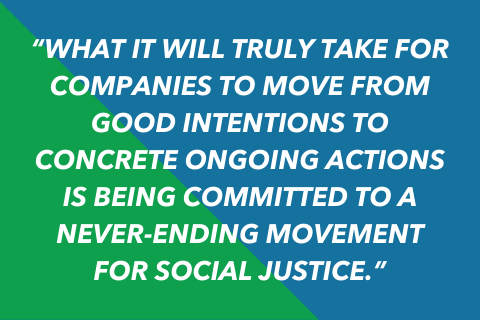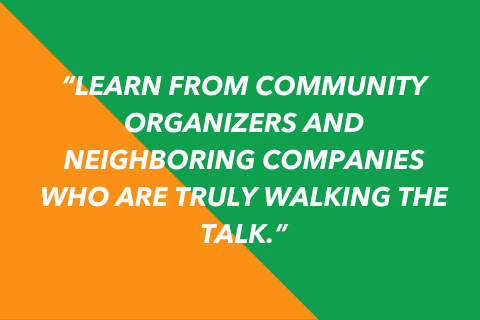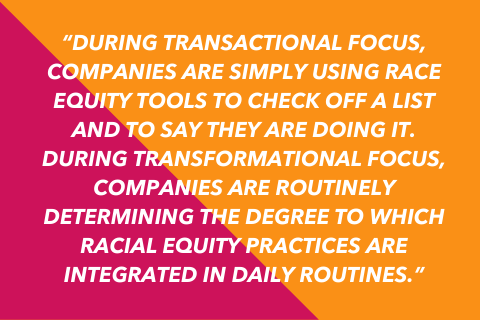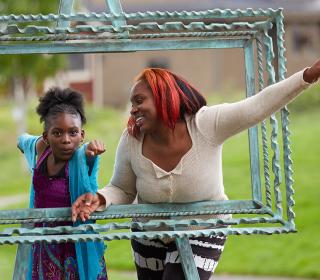As we reflect on the racial equity uprisings of 2020 almost a year later, and the subsequent statements of solidarity most organizations issued during that time, it’s increasingly clear the fight for true progress continues in workplaces across the country.
We interviewed Dr. Sharon Knight - an eminent race and social justice activist with passion and expertise in culturally responsive leadership and pedagogy - for her perspective on how organizations and workplaces can move beyond equity intentions to meaningful action.
Q: Following the social uprisings of 2020, many companies issued statements emphasizing their commitment to their Black employees and racial equity - but only some were backed up by concrete action. What’s your take on the progress society is making, and what it truly takes for companies to move from intention to action?
Society’s progress is extremely slow when it comes to race relations in the USA, especially for BIPOC people. One major reason is that society reacts to moments in time - versus a commitment to responding on a regular basis because of a dedication to the social justice movement, which is happening all the time.
An example of reacting to a moment in time was the public execution of Mr. Floyd, which occurred during COVID-19 lockdown. During this moment many people were frustrated from being locked down. Having an opportunity to protest Mr. Floyd’s killing gave companies and people a moment of freedom. For some people the fight was not about injustice, but personal freedom. Excessive police force/and or police killings of African Americans did not end. In fact, they were happening during the trial. Unfortunately, because mass numbers of companies are caught up in reacting to moments in time - instead of sustaining a position of solidarity with BIPOC people - when the moment was over and COVID-19 was coming to an end, companies went back to business as usual. What it will truly take for companies to move from good intentions to concrete ongoing actions is being committed to a never-ending movement for social justice.

Q: For companies/leaders new to owning their role in addressing racial injustice, what are some of the common ways white supremacy, racial bias, and racism are reinforced in workplace settings?
White supremacy, racial bias, and racism are reinforced in workplace settings via the concept of “Whiteness”. People of Color and White people in color* can uphold the concept of Whiteness, which encompasses normative beliefs, perspectives, values, and/or ways of being that are intended to consciously and subconsciously sustain White people at the top of the racial hierarchy. Such action is reinforced by rewards and punishment. The more companies/people’s beliefs, thoughts, and practices reflect that of Whiteness, the more companies/people are rewarded. The more they deviate from such, the more companies/people are punished. Rewards and punishment tend to be connected to livelihood (employment, life/death, reputation, and or withdrawal of benefits, to name a few) of an individual, group, or collective.
Q: What would you tell a company who wants to move from antiracist intention to antiracist action, but doesn’t know where to start?
- Learn about the concepts associated with, racism, race-based trauma, internalized racism/superiority
- Take a position of being committed to the movement for social justice, not the moments
- Learn from community organizers and neighboring companies who are TRULY walking the talk
- Set up your infrastructure to formalize and normalize a culture that is anti-racist, multicultural, inclusive, and culturally responsive
- On a quarterly basis, assess your people, policies, practices, and programs against race and social justice principles, an equity-driven service approach, and culturally responsive practices. You can’t go wrong.

Q: What are common misconceptions and missteps you see organizations make when it comes to achieving racial equity in the workplace?
Lack of accountability. Unlike any other risk management factor in the company, there are no accountability/compliance measurements for racial equity or anything associated with it. Thus, companies, nor the people within them, are held accountable to ensuring racial equity, social justice, or the like. The consequence results in transactional structures and practices that keep companies circling and circling as they try to catch their tails.
What companies want is transformational change, in which structures and practices keep them on track, moving forward, and towards realizing race and social justice. During transactional focus, companies are simply using race equity tools to check off a list and to say they are doing it. During transformational focus, companies are routinely determining the degree to which racial equity practices are integrated in daily routines, how well individuals and the company are implementing those practices, and how beneficiaries of the company’s practices are realizing their full potential and personal aspirations.

Q: How can organizations ensure their efforts towards antiracism and racial equity are meaningful and long-lasting?
As stated earlier, companies must commit to the social justice movement and stop reacting to moments of social injustices. Also, they must develop their organizational members and company so that both are equipped to constructively manage social inequities, realize multiculturalism, and sustain a climate of inclusion and a socially just position.
Q: In your perspective, what is working? What are you seeing that gives you hope for the future?
What I believe is working is People of Color and White People in color who truly believe in race and social justice, are being about it and not simply talking about it. Also, they are not giving up! What gives me hope, and always will, is never forgetting what our ancestors (POC and White people in color) who TRULY believed in Social Justice and went about realizing it through action, went through for me to be here today and live the life I aspire to. I will never forget I inherited the fight for social justice, as it is never ending.
*White people in color: Whiteness is a concept. White people are a color, as are People of Color. When referring to White People in Color, I am referring to the color, not the concept. Not all White People in Color hold up the concept of Whiteness. Many White people were killed alongside our ancestors of Color, because of their resistance to the concept of Whiteness
Dr. Sharon Knight is an eminent race and social justice activist with passion and expertise in culturally responsive leadership and pedagogy. Her unique proficiency is grounded in equity-driven adult education with extensive experience in professional development design, implementation, and evaluation. For over 35 years, she has partnered with community-based organizations, governmental agencies, and private and public education establishments to develop policies and strategies that build seamless, quality systems for professional development. Dr. Knight holds a Master's in Leadership and Education and a Doctorate in Organizational Management and Leadership.

Annalee Schafranek is the Marketing & Editorial Director at YWCA. She contributes agency news, press releases, and media coverage to the website. Annalee’s educational and professional experience has always focused on the place where gender equity and media meet.
We share the stories of our program participants, programs, and staff, as well as news about the agency and what’s happening in our King and Snohomish community.

